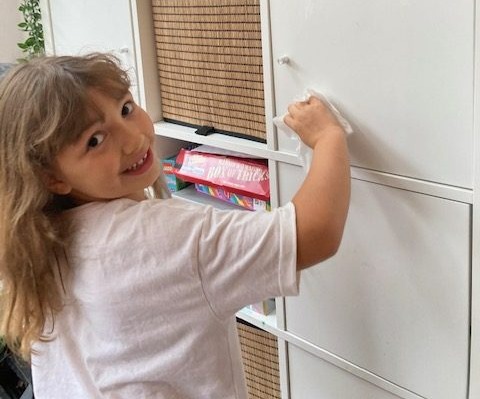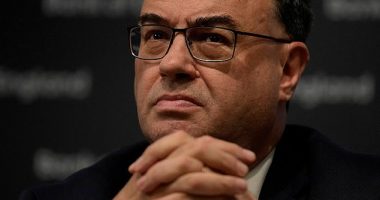THE sky-high cost of buying a home means you need to start saving young to have any hope of getting on the property ladder without any extra help.
Eva Lockwood from West Yorkshire has taken this to heart and – aged eight – already started saving cash to go towards a deposit for her first home.
And she knows exactly what’s she looking for when she buys her first property.
“I want a house near B&M, Smyths Toys and Burger King,” she told The Sun.
She also plans to have a spare room to rent out which will help to pay the mortgage.
Taking in a lodger is one way of paying off your home loan faster.
Read more on first-time buyers
Eva earns her money by helping with chores around the home.
She could get £1 for a light tidy of the bedroom, for example.
Or if it’s really messy, she could make up to £5 a time.
“I also save the money I get for Christmas and my birthday,” Eva says.
Most read in Money
With the help of mum Rebecca Lockwood, 33, Eva also sells items such as pencil cases on Vinted and eBay.
Depending on how many chores she has done, Eva will typically earn between £25 and £50 a month.
The cash is then roughly split with around a quarter to spend now, another quarter for short-term savings, and the remaining half goes into long-term savings pots.
Dance teacher and mum of two, Rebecca says: “Me and my husband found it difficult to buy a house young.
“We decided to talk to the kids about being financially secure as soon as possible.
“We wanted them to understand about having money and making it work for you.”
With her short-term savings, Eva is building up enough cash to buy the new Barbie doll.
And the long term cash will one day go towards a deposit for a home.
Long term savings are split between cash with around £3,000. And Eva also has a stocks and shares ISA with around £1,200.
A stocks and shares ISA is a tax-free savings account where you can keep investments, including funds and bonds, as well as individual shares.
Parents can save up to £9,000 for children into a Junior ISA (JISA) in the 2023/24 tax year, which ends in April next year.
As with ISAs, Junior Isas can see the limit split between cash and stocks and shares.
Rebecca says: “Every few months or so we will sit down and look at how the investment is performing to help Eva understand about investing her money.
“Eva is currently saving for a house deposit so that she can buy her own home, hopefully at age 19.”
The family uses the prepaid debit card and financial education app GoHenry to help budget.
Money for Eva to spend goes on the card which she might use for treats when at the shops.
Rebecca and Eva have watched GoHenry videos together to help get a better understanding of how money works.
Other apps to help children under money include NatWest Rooster Money, Nimbl and Revolut < 18.
It comes as data from GoHenry suggests kids are saving more than ever – with four in ten children now planning how to fund life milestones such as buying a home or driving lessons.
How to teach children about money
The cost of living crisis has made it harder for parents to gift children cash to help them on the ladder.
One in four parents surveyed by GoHenry said they don’t plan on saving money to help their children buy a property.
This makes it more important than ever for young generations to understand how money works and the benefits of saving.
Louise Hill, chief executive and co-founder of GoHenry, has the following tips for getting into a money mindset for your family:
Set challenges for kids
To help kids be more intentional with their spending, parents can challenge them to set a budget and save for an item – or wait for sales and discounts, rather than paying full price.
Alternatively, teach kids the very valuable lesson of needs versus wants, by encouraging them to wait a few days before they decide to make a purchase.
Help them understand that a new party dress or trainers aren’t a need, especially if they will struggle to pay for it later – it’s their future self that will suffer.
Limit luxuries and opt for budget-friendly alternatives
Setting a budget and getting creative with some fun alternatives can help parents teach their kids to take pleasure in the simple things to keep costs in check.
Instead of costly outings like dinner and a movie, why not try an at-home movie night with some delicious homemade ‘fake-away’ food?
Talk to your children about how much has been saved by opting for a cheaper option and how much that will save if you did it every week or every month. Give tangible examples, so the amount saved is enough to pay for a new toy.
With Christmas around the corner, you could suggest alternative present ideas such as buying second-hand from charity shops or even making handmade gifts. Talk about price differences with children and when something is worth more money and when you can save.
It’s also a good opportunity to talk about cutting down on waste to protect the planet too.
Introduce savings goals
It doesn’t matter how much pocket-money your child is saving – it could be a big or small amount.
But the act of saving regularly helps open up conversations around money in the home and gets children thinking about the value of cash.
Read More on The Sun
This is super important as we move to a cashless society and children don’t see physical money exchanging hands in the way we used to.










